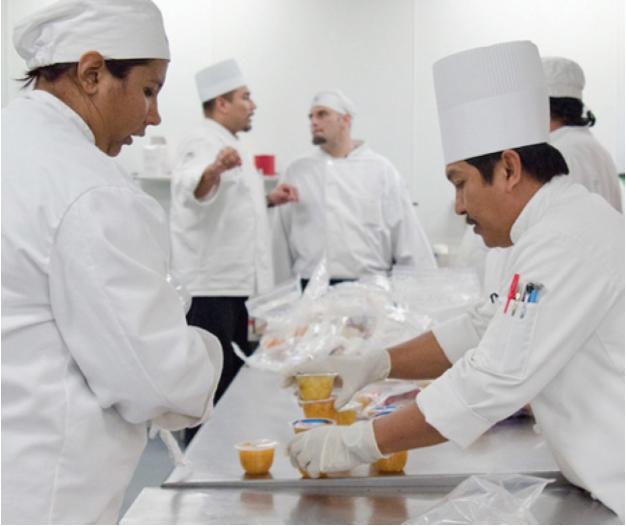Photo Courtesy of Flickr Creative Commons
One of the most difficult parts of opening a restaurant is hiring. You have to hire a range of employees from bartenders to servers to kitchen staff. You obviously want all of your employees to be qualified, but what does this mean, especially when it comes to your kitchen staff? Do you need cooks and chefs that have culinary degrees? Surely, education is important, and those with degrees and certifications are better qualified, right?
Maybe, but not always. Unlike many professions, culinary school is not a requirement to become a chef, and many successful chefs have nothing but the experience of working in restaurants under their belts. Of course, you can make it a requirement for your kitchen staff to have culinary degrees, but this may not always be the best idea.
There are many reasons to use culinary school graduates, but there can be some downsides. Let’s first talk about the pros of hiring culinary school graduates.
Photo Courtesy of Flickr Creative Commons
Knowledge. On average, to earn a culinary arts degree, a student spends two years of full time schooling to learn everything there is to know about not only professional cooking, but also how restaurants operate from every angle. This means that a culinary graduate has learned how to cook just about every type of food, but also that he or she knows how to purchase inventory and manage a stock room. Most schools require students to take classes covering everything from baking and desserts to wine to bar management. Perhaps most importantly, students will have taken extensive training on food safety, so they’ll know the basics on how to handle food properly and avoid food borne illness. Many schools even require students to get a certification proving this knowledge.
In addition, most students will have completed an internship in a restaurant or other food service operation, where they are graded and judged on what they have learned in school. This is guaranteed professional experience.

Photo Courtesy of Flickr Creative Commons
Passion. Since the restaurant industry employs more people that almost any other industry, it’s easy to get employees that are simply looking for work as opposed to those that are actually excited to go to work everyday.
A culinary graduate has not only invested a lot of time and energy into their degree, but also a lot of money. Culinary schools are not inexpensive, with many students paying what is the equivalent of a new home for their education. It’s not likely that many people would do this for something they don’t really care about. A culinary graduate will be much more likely to enjoy their job, like the work they do, and take pride in every detail. This is, of course, better for the employer, as unhappy employees can cause nothing but headaches.

Photo Courtesy of Flickr Creative Commons
Skills. Cooking at home is nothing like cooking in a professional kitchen, and if you hire someone with little to no experience, it’s likely you’ll need to teach them the basics like how to use a knife properly, or the differences between braising and roasting. There will be a steep training period, which, as you probably know, isn’t always budget friendly. If the employee leaves shortly after the training period, you have to start all over with both time and money.
It’s not to say that you won’t have to train culinary graduates, but you can focus more on training them how you operate your business rather than teaching them to work in a restaurant.
Of course, hiring those with a formal education in food service seems like it’s the best idea, and there are many positives. But, there may be a downside or two that you’re not thinking about. Let’s look at why culinary school grads aren’t necessarily the best option.
Pay Rate. Culinary school is expensive and time consuming, as mentioned above. This means loans to pay back, as well as years of not being able to work full time to make up for it. You might be surprised to learn that many educated food service workers expect a higher rate of pay than someone without an education. They will expect more frequent raises, and will likely not be happy unless they can move their way up through the ranks. It’s not to say that these costs aren’t worth it, but if you have a tight budget, a few dollars more an hour can seem impossible. It’s also much more difficult to justify higher paid employees when your restaurant is going through a rough spot.
Graduates May Be Overqualified. Depending on the type of restaurant you own, a culinary graduate may not even be necessary. If you own a fast casual type place with not a lot of actual cooking, or something more simple like a food truck, someone with a lot of skills will really only cost you more money. Sure, having someone that knows how to operate professional equipment and the basics of food safety is nice, but these things are not that difficult to teach.

Photo Courtesy of Flickr Creative Commons
High Expectations. No one goes to culinary school to do a job that anyone off the street can perform. This isn’t to say that someone wouldn’t take a position in order to get a foot in the door, but it’s unlikely that he or she will be content as a line cook forever. Keep this in mind when hiring graduates and ask yourself what your plans are for exceptional employees. If you don’t have much to offer in the future, it may be better to stick to those with lower expectations. Also, it’s important to remember that simply telling a graduate that there’s not much room to grow may not do much: Many people will say they’re fine with it, but after a short time, you’ll find they feel differently.
There is no doubt that culinary school is an important part of the restaurant industry, and graduates have a lot to offer potential employers. As a restaurant owner, it pays to weigh your options carefully when deciding whether an educated staff can help or hurt your bottom line.
Do you hire culinary graduates? If so, tell us your experiences!




